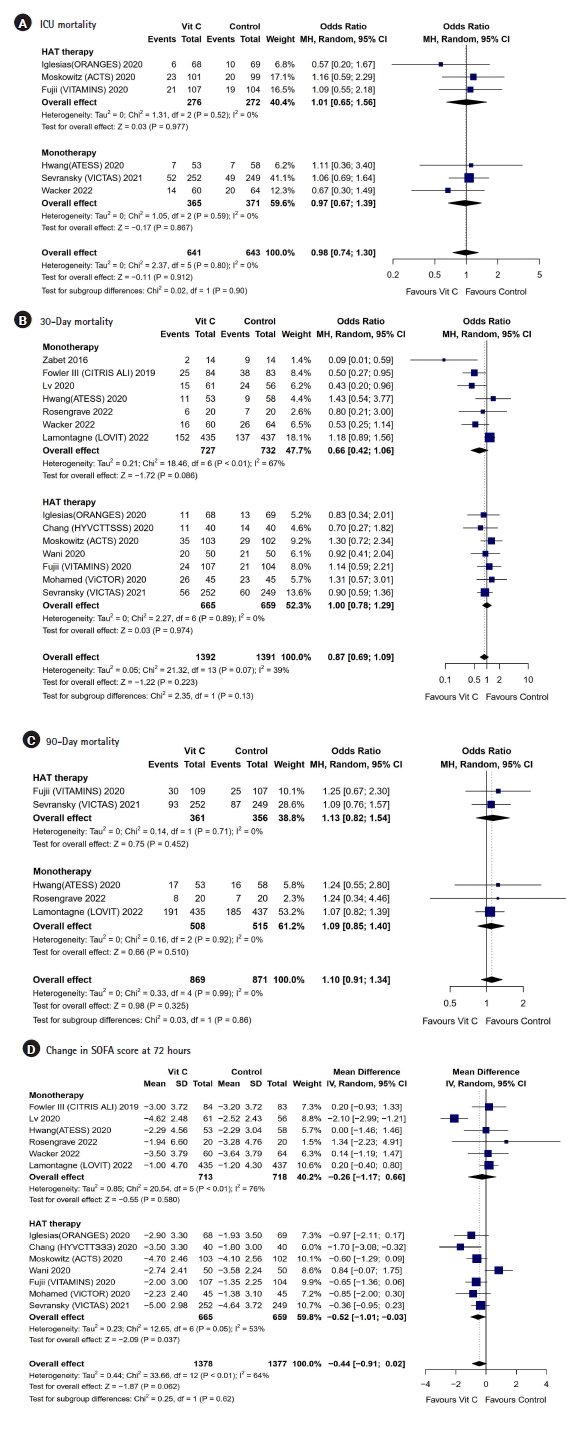Articles
- Page Path
- HOME > Acute Crit Care > Volume 37(4); 2022 > Article
-
Letter to the Editor
Infection Meta-analysis assessing the effectiveness of intravenous vitamin C in patients with sepsis and septic shock -
Muhammad Ali Tariq1
 , Hamza Amin2
, Hamza Amin2 , Uzair Ali1
, Uzair Ali1
-
Acute and Critical Care 2022;37(4):674-677.
DOI: https://doi.org/10.4266/acc.2022.01088
Published online: October 21, 2022
1Department of Medicine, Dow University Hospital, Dow International Medical College, Karachi, Pakistan
2Department of Medicine, Dr. Ruth KM Pfau Civil Hospital, Dow University of Health Sciences, Karachi, Pakistan
- Corresponding author: Muhammad Ali Tariq Department of Medicine, Dow University Hospital, Dow International Medical College, Gulzar-e-Hijri Scheme 33, Suparco Rd, Karachi, Pakistan Tel: +92-312-2319607 Fax: +92-342-88454 E-mail: m.alitariqpk@gmail.com
Copyright © 2022 The Korean Society of Critical Care Medicine
This is an Open Access article distributed under the terms of the Creative Commons Attribution Non-Commercial License (http://creativecommons.org/licenses/by-nc/4.0/) which permits unrestricted non-commercial use, distribution, and reproduction in any medium, provided the original work is properly cited.
-
CONFLICT OF INTEREST
No potential conflict of interest relevant to this article was reported.
-
FUNDING
None.
-
ACKNOWLEDGMENTS
None.
-
AUTHOR CONTRIBUTIONS
Conceptualization: MAT. Formal analysis: all authors. Methodology: all authors. Writing–original draft: HA, UA. Writing–review & editing: all authors.
NOTES
SUPPLEMENTARY MATERIALS
Supplementary Figre 1.
Supplementary Table 1.

- 1. Rudd KE, Johnson SC, Agesa KM, Shackelford KA, Tsoi D, Kievlan DR, et al. Global, regional, and national sepsis incidence and mortality, 1990-2017: analysis for the Global Burden of Disease Study. Lancet 2020;395:200-11.ArticlePubMedPMC
- 2. Thompson K, Venkatesh B, Finfer S. Sepsis and septic shock: current approaches to management. Intern Med J 2019;49:160-70.ArticlePubMedPDF
- 3. Sato R, Hasegawa D, Prasitlumkum N, Ueoka M, Nishida K, Takahashi K, et al. Effect of IV high-dose vitamin C on mortality in patients with sepsis: a systematic review and meta-analysis of randomized controlled trials. Crit Care Med 2021;49:2121-30.ArticlePubMed
- 4. Lamontagne F, Masse MH, Menard J, Sprague S, Pinto R, Heyland DK, et al. Intravenous vitamin C in adults with sepsis in the intensive care unit. N Engl J Med 2022;386:2387-98.ArticlePubMed
- 5. Agarwal A, Basmaji J, Fernando SM, Ge FG, Xiao Y, Faisal H, et al. Parenteral vitamin C in patients with severe infection: a systematic review. NEJM Evid 2022;1.Article
References
Figure & Data
References
Citations

- Randomized Clinical Trial of Antioxidant Therapy Patients with Septic Shock and Organ Dysfunction in the ICU: SOFA Score Reduction by Improvement of the Enzymatic and Non-Enzymatic Antioxidant System
Alfredo Aisa-Álvarez, Israel Pérez-Torres, Verónica Guarner-Lans, Linaloe Manzano-Pech, Randall Cruz-Soto, Ricardo Márquez-Velasco, Sergio Casarez-Alvarado, Juvenal Franco-Granillo, Marcela Elizabeth Núñez-Martínez, María Elena Soto
Cells.2023; 12(9): 1330. CrossRef

 KSCCM
KSCCM
 PubReader
PubReader ePub Link
ePub Link Cite
Cite


